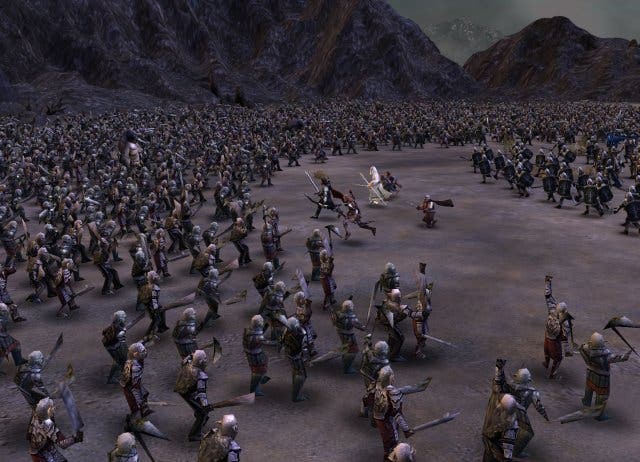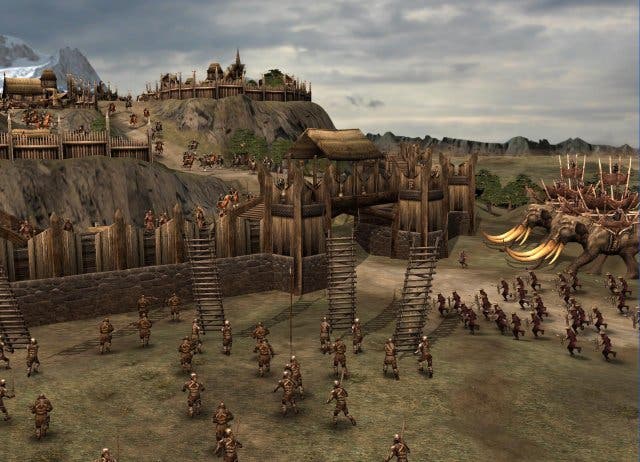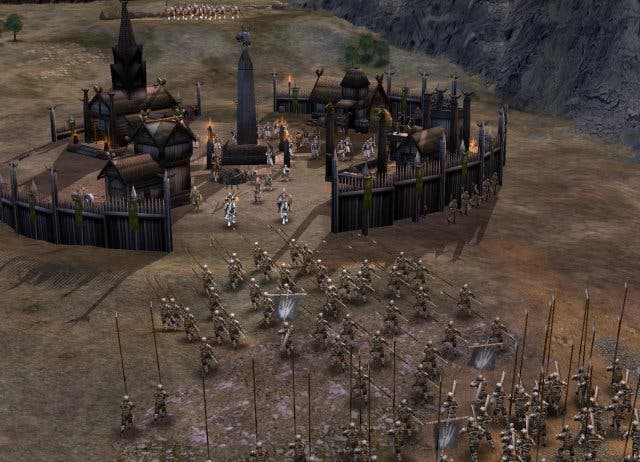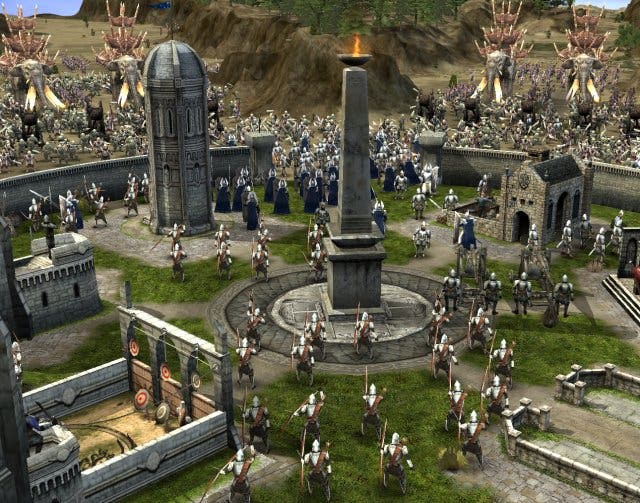The Lord of the Rings, The Battle for Middle-Earth
Laud for the Rings.
Order yours now from Simply Games.
"How many times do I have to kill you, dammit!"
It's two o' clock in the morning, and I've just killed him for a third time. You'll have to excuse my frustration. It's not that I haven't enjoyed killing him each time; it's more the crushing disappointment when he cheerfully appears once more at the start of the next mission. In the revisionist fantasy of The Lord of the Rings, The Battle for Middle-Earth, death has lost its meaning.
Improv

I'm sorry, I should explain. There is... Hmm, how to put this delicately. There is a certain character in the Lord of the Rings whom I wouldn't mind seeing being turned into stew for an Uruk-Hai raiding party. Or into a lollipop for a giant spider. I won't say which character I'm talking about, because I've been assaulted by rabid fangirls before and I still occasionally grieve for the children I will probably never be able to have. However, I've taken a certain degree of sadistic pleasure in sending him to his death - three times, now. But he keeps on coming back.
That's not all, though. Earlier on, I rescued Boromir from his death on the shores of the Anduin, and he's been bravely fighting alongside the forces of Gondor ever since; and Gandalf never fell to the whip of the Balrog in Moria, because Aragorn stuck the bugger with his sword first. Saruman is running around with a group of orcs somewhere near Minas Tirith casting powerful battlefield spells, Sam had the assistance of a number of the guards of Gondor when he handed Shelob her arse on a plate, and oh - that Balrog I mentioned? I just summoned it to kick about some foes in the fields of Rohan.
If you're not getting the hint yet, what I'm saying is this: if you're a Lord of the Rings purist, look away now. If you complain loudly at the removal of Tom Bombadil from the films, or have ever been known to make a statement like "the removal of the scouring of the Shire ripped the narrative and moral heart from Tolkien's vision!" in the pub, then do not seek out this game. Seek professional help instead. If, on the other hand, you just loved the epic fantasy of the trilogy and think that the idea of leading the armies of Middle-Earth into mortal combat sounds like your cup of tea - step right up.
General improvement

Basing a real-time strategy game on a movie is a concept which looks fraught with difficulty, but as the above examples probably make clear, EA Los Angeles (reportedly including at least some of the team behind the piss-poor Command & Conquer Generals [now now Rob, it wasn't that bad -possibly misguided Ed who actually really enjoyed Generals, but hey], thankfully seeming rather more on form this time around) has been given a surprising amount of freedom to play around with the story and characters, with the focus being on what will make a good game rather than on fitting in exactly with the plot of the trilogy. That's a good move. Freed from the restrictions which seem to be imposed on most other movie tie-ins, Battle For Middle-Earth does throw up some peculiarities such as suspiciously resurrecting heroes and fictionally unlikely Balrog summoning, but in return it offers a genuinely compelling game which benefits hugely from its epic setting and the player's familiarity with the universe and characters, rather than being held back by it.
Four unique sides are playable in the game - the kingdoms of Rohan (which has incredibly powerful cavalry, as you'd expect) and Gondor (great defensive capabilities), and the evil axis of Mordor and Isengard, which are largely focused on swarming the enemy with wave after wave of orcs, and also have access to powerful siege units such as those bloody great elephant things. Aerial support is provided by giant eagles on the allied side and by Nazgul on the axis side (which are the convenient monikers I'm going to be using to refer to the two sides from now on, gasps of horror from Tolkien fans opposed to the concept that his book was an allegory for the world wars notwithstanding), and each side has a menagerie of hero characters at their disposal, most of whom are indeed disposable, and whose influence can often swing the progress of a battle.
The campaign game is played out on a large 3D map of Middle-Earth, which is divided up into a set of provinces. You move your armies (up to three of them) around this map, dropping into each province individually to fight through a battle - leading to the capture of the province, and effectively giving you control over the course of the campaign, although occasionally you'll be called upon to fight through a specific part of the plot. These plot-specific parts (including the Fellowship going through the Mines of Moria, or fighting the Uruk-Hai at the Anduin, or the climactic siege of Minas Tirith) will sometimes give you control simply of a small group of heroes and task you with keeping them alive - an odd departure from their normal expendability, and arguably one of the weakest elements of the game. When will RTS creators learn that taking a couple of units through a mission simply isn't as much fun as controlling an army?
Neatly helmed

The overview map itself is very simple, so don't arrive expecting something on the level of Rome: Total War, but it serves its role well and as a plus point, it's beautifully modelled and animated. Each province that you capture boosts your power, giving you special abilities such as the ability to summon Elvish allies in battle, boosting your production rate or simply raising the cap on the number of units you can have at your command. In one of the nicest touches in the game, the armies you create are also persistent, so the force you end one battle with is by and large the same as the force you start with next time around, and normal units as well as heroes level up and gain experience. You can even rename your regular units, giving your army that rather more personal touch.
This aspect leads to some of the finest moments in the game - such as the level where you defend Helm's Deep from invaders, up to the point where you are rescued by the appearance of Eomer's army of horsemen - the very army which you've just spent several missions assembling on the plains of Rohan. It also gives rise to a particularly gruesome aspect of the evil forces in the game - when playing as the forces of Mordor or Isengard, you can order your own units to kill each other in order to boost their experience, which is a cunning way to exploit the tendency of the unit production cap to leave you with far more resources than you can possibly spend.
It would be fair to say that the unit cap is an annoying aspect of the game. You can see the logic behind it, but it continues to be frustrating right throughout the campaign. That downside to the gameplay, however, is largely made up for by the various right decisions made throughout - such as the incredibly simple resource system, which eschews the usual nonsense with peasants running around mining gold and cutting down trees which every other fantasy RTS relies on in favour of a single resource meter which is generated on an ongoing basis by your farms (or slaughterhouses if you've gone over to the dark side). The game tries to prevent battles from descending into resource races, although it does this with limited success - even though it heavily restricts where you can place buildings and how resources are earned, many battles in the campaign will still come down to wars of attrition as you inch across a map fortifying each new region in turn.
Lord of the RTS?

Thankfully, it doesn't prevent the game from being incredibly spectacular once it gets going - although this is no Rome: Total War, the clever decision to make each unit into a group of five men (or ten orcs for the swarm-happy axis of evil) means that you still end up with epic scale battles, and watching a set of siege elephants bearing down on the gates of Minas Tirith is a scene to stir the heart of any RTS player. Graphically, Battle for Middle-Earth is one of the best looking strategy games out there; it can strain a little when there are too many units on screen, but in general it's an impressive feast for the eyes, with every major location from the movies recreated in loving detail.
Material from the movies themselves is used slightly unusually - Electronic Arts obviously had permission to use movie footage and was determined to do so even though it doesn't fit terribly well. Rather than using entire cut-scenes from the film, you get clips of film played in the game interface at key points in the game - which is an interesting approach, but ends up feeling slightly tacky. Much more successful is the use of the actors from the movies to provide voices - both Ian McKellen and Christopher Lee were on hand to reprise their roles, as were the likes of Elijah Wood and Andy Serkis, and the stand-ins found for other actors such as Viggo Mortenson are excellent. Much more than the movie footage, it's the voices and the design of the units and locations which tie this game in to the films - a genuine example of a solid game being elevated significantly by the intelligent use of a great license.
While EA's use of the Lord of the Rings franchise to date has largely been fairly impressive, the direct movie tie-ins have all been quite shallow and this Christmas' console offering, The Third Age, was so blatantly ripped off from Final Fantasy X that you half expected Auron to pop up at any minute. Battle for Middle-Earth, however, would be an impressive game even if it weren't based on Lord of the Rings. It's a clever and well-constructed strategy title with plenty of innovation of its own, and a genuinely great use of the franchise. Easily the best of the Lord of the Rings games to date, it also comes well recommended as one of the best PC strategy games of the year.
Order yours now from Simply Games.








